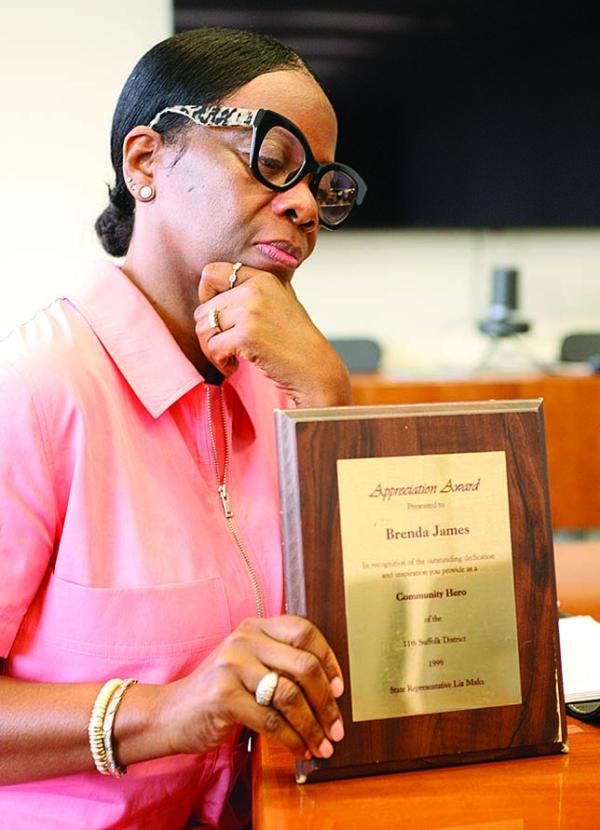August 25, 2022

Former BPD Officer Brenda James with a community award that she received for her work with children and families while she was an officer from 1994-2012. Seth Daniel photo
A Mattapan native who is suing the city of Boston for lost wages and damages after she was fired from her job as a Boston police officer in 2014 is awaiting a final decision from a state judge sometime soon.
Brenda James, 59, says she was unfairly punished and eventually terminated by a department she characterizes as a “good ol’ boys network” that persists, despite the elevation of leaders of color to command posts, including commissioner.
“I would advise any young person to take a hard look at the culture and make sure they are protected,” she told the Reporter in an interview this month. “I never felt in danger on the street as a police officer, but my life was put in danger that night inside the police station.”
That night in question was June 8, 2012, when James was called into Capt. Paul Russell’s office in the E-13 (Jamaica Plain) police district stationhouse. According to James, her commander wanted to discuss an extended absence that had occurred months before. James said she was hesitant to go in without a union representative present, but did so anyway. Russell then issued her a five-day suspension, a penalty that was later rescinded by the state’s Civil Service Commission.
What happened next is what is in dispute. James, as backed up by the testimony of other officers, says that Russell forcibly removed her gun from its holster in an awkward and dangerous confrontation. Now retired, Russell and the city say that confrontation never happened, and that James was not being truthful.
Seven days after the meeting, James filed an official complaint, launching a legal battle that continues today. Two years later, in 2014 she was fired by then-Commissioner William Evans, partly for the incident with Capt. Russell, she said, asserting that “It illustrates that if you’re not a member of the good ol’ boys, you won’t get protection.”
Adds her attorney, Max Stern: “And God forbid you challenge that. She put in a complaint against Capt. Paul Russell. His father was a police superintendent. That’s who she was challenging.”
Spokespersons for the BPD and the city said they could not comment on the case, as it is ongoing litigation.
Mayor Wu’s office said her administration is working to diversify the police force and believes that with more opportunities, such a job will be a great career for anyone, including young people of color from neighborhoods like Mattapan and Dorchester.
“Through initiatives like the cadet program, the city is striving to create more pathways into the Boston Police Department,” read a statement. “Mayor Wu is committed to ensuring the city workforce reflects Boston’s neighborhoods and the residents we serve, including our public safety agencies. Our administration is working to break down barriers to expand opportunities for women and people of color to join every department in city government.”
This month, Wu swore in a new police commissioner, a longtime BPD veteran Michael Cox who was the subject of one of the department’s most infamous internal affairs cases. He was badly beaten by fellow officers in a case of mistaken identity during a police pursuit in Mattapan in 1994. The case resulted in the prosecution of several officers who were convicted of lying about what happened to Cox that night.
Cox has been framed by some as a reform agent for the Boston Police Department, but James insists that her unresolved case is evidence that young people of color should think twice before joining the department’s ranks.
“They talk a lot about opportunity and access,” said James. “I was deprived of my career. I don’t think I would honestly advise any young person to become a part of that culture and world without having some kind of protection. You would have to go in expecting to be treated unfairly and subjected to disparate treatment.”
Her case was the subject of a hearing in July before the state’s Division of Administrative Law Appeals. A judge could render a decision any day.
James regards her legal fight as a combination of making sure nothing like this is repeated and preserving her good name that existed before the 2012 incident.
She joined the department in 1994 and says her 20 years were filled with commendations for her work as a patrol officer and as a liaison to children and families.
If successful, she said, she is not sure that she would seek to renew her policing career. No outcome in her case, she said, will change the culture she said she ran up against, and which she believes would still confront other diverse candidates.
“For diversity to work, we need to ensure people can finish their career and not just to fulfill some hiring numbers,” she said. “I was a person that got recruited to preserve that appearance of diversity and look what happened to me…It’s just a roll of the dice if you’re not a member of the good ol’ boys.”



